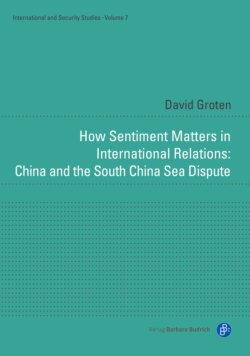Читать книгу How Sentiment Matters in International Relations: China and the South China Sea Dispute - David Groten - Страница 28
На сайте Литреса книга снята с продажи.
2.3.4 References to Rights
Оглавление“Interests can conflict and must be balanced; rights must be defined so that they do not conflict” (Scanlon, 2008, p.68).
States pursue external recognition of their self-ascribed rights associated with its status and identity, let alone self-worth conceptions. Conversely, [54] misrecognition (whether deliberatively or coincidental) of such rights71 is associated with disrespect. Rights, as understood here, can involve rather material factors72, for instance, the right to economic prosperity and security, and somewhat non-material aspects such as (legal) equality, fair treatment, legitimacy or ‘voice’73. A distinction between the two is neither straightforward74 nor feasible for this project’s purpose as they are both, closely related to status and respect. In this vein, external support of a country’s rights75 can serve as a signal of self-worth (incl. status and identity), whereas neglect, violation or inadequate consideration thereof can inflict harm and negatively affect an actor’s self-worth. In sum, this third indicator discusses the most frequently invoked political, legal, economic and military rights affected by external parties’ conduct.
